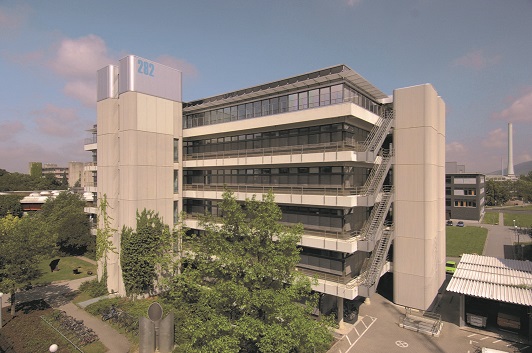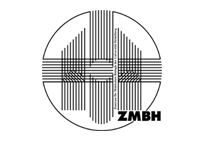
Contact
Universität Heidelberg
Im Neuenheimer Feld 282
D-69120 Heidelberg
Germany
![]() : +49(0)6221 – 54 6800
: +49(0)6221 – 54 6800
Fax: +49(0)6221 – 54 6809
Email: zmbh@zmbh.uni-heidelberg.de
Zentrum für Molekulare Biologie der Universität Heidelberg
Within the life science faculties of the University of Heidelberg, the ZMBH (Zentrum für Molekulare Biologie der Universität Heidelberg) is a center of excellence for both research and higher education in basic and biomedical molecular biology.
Our research aims at fundamental questions of molecular and cellular biology at the level of molecules, cells and organisms. We would like to understand the mechanistic principles of different stages in the life cycle of biological entities, addressing questions of biogenesis and development, stability and quality control as well as aging, degeneration and the molecular basis of disease of biological systems.
Topics such as
– the cell cycle, in particular mitotic events
– biogenesis of polypeptides
– stability and quality control of biosystems including degeneration of cells
– gene expression and epigenetic regulation
are of major interest for the community of researchers at the ZMBH. We also closely collaborate with the research groups of the research program Cell and Tumor Biology of the German Cancer Research Center (DKFZ) in the DKFZ-ZMBH-Alliance. This alliance comprises joint research projects, the mutual access to core facilities, coordinated recruitment activities and joint scientific ones. More information about the research topics of our colleagues at the DKFZ can be found on the DKFZ’s web pages.
A plethora of model systems including bacteria, yeast, trypanosomes, drosophila, xenopus and mammals are studied at the ZMBH. These, together with a broad range of multidisciplinary approaches, ranging from biophysics and biochemistry to cell biology, molecular biology and genetics, provide a rich and diverse scientific environment.
We also actively foster applications of basic research to biomedicine and biotechnology. Notable achievements include the development of a vaccine against Hepatitis B, the engineering of the most commonly used regulatable switch for genes in eukaryotes (the tet-system) and the discovery of the Aß peptide as a causative agent in Alzheimer’s Disease. Current industrial collaborations include the development of a vaccine against malaria and the use of chaperones as drug targets and biotechnological tools.
The ZMBH contributes significantly to the Bachelor and Master Programs of the Faculty of Biosciences. We provide intensive training in the most recent developments and techniques in Molecular and Cellular Biology and Biochemistry, and prepare students for direct entry into competitive research. Doctoral students are either members of the Graduate School of the Excellence Initiative or of the ZMBH-internal Doctoral coaching program. While the ZMBH provides support for international scientists and students to learn the German language, it is an international institute in which English is used in all research seminars.
The ZMBH hosts up to 15 research groups. In total there are positions for nine tenured professors, 4 junior group leaders, and 1-2 additional groups. Altogether the ZMBH has around 240 researchers and staff from over 20 different countries. The ZMBH has a common budget that allows flexible financing of our research and acquisition of cutting-edge technologies. The scientific advisory board is composed of internationally renowned researchers and provides strong strategic and scientific support. All our research groups are backed by central administrative and scientific facilities. Supported facilities include mass spectrometry and proteomics, microscopy, FACS, animal facilities, computing as well as mechanical and electrical support and workshops.
The ZMBH department structure has been tailored to provide a framework for cutting-edge multidisciplinary research and to offer young scientists early independence and responsibility. Communication between different laboratories is encouraged by regular retreats, colloquia and conferences, as well as a lively social agenda.
Our research group leaders are an active part of the networks on campus which are the result of the successful participation of the life science community in the excellence contest (Exzellenzinitiative) launched by federal and state governments. Activities comprise the CellNetworks research cluster, the Heidelberg Biosciences International Graduate School (HBIGS), and the already mentioned DKFZ-ZMBH alliance.
Our Principal Investigator participating in the EvoCell Program

Henrik Kaessmann
ZMBH Research Group Leader
Functional evolution of mammalian genomes
After obtaining my PhD in 2001 from the University of Leipzig for work carried out at the Max Planck Institute for Evolutionary Anthropology in Leipzig, I worked as a postdoctoral fellow at the University of Chicago, USA. From 2003 to 2015, I carried out research as a group leader (i.e., as an assistant, associate and then full professor) at the Center for Integrative Genomics, University of Lausanne, Switzerland. From 2010 to 2015, I was also a group leader at the Swiss Institute of Bioinformatics (SIB). Since 2015, I have been working as a full professor at the Center for Molecular Biology of Heidelberg University (ZMBH).
My overall research aim is to unveil the molecular basis of the phenotypic evolution of mammals and other vertebrates. The primary current focus of my group is to elucidate the cellular origins and evolution of mammalian/vertebrate organs and the underlying gene regulatory changes.

